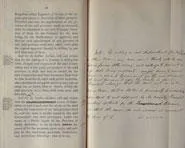
Principal aims in cataloguing
In cataloguing a collection such as this, which not only contains numerous individual items of rarity and significance but whose interest equally lies in its creation as a collection (when and how items were acquired, how they were handled and used by officials of the Foreign, Colonial and Dominions Offices), we have two principal aims: to create a full and accurate bibliographic record of each item and to assign appropriate and consistent index entries for people, places and subjects so that the researcher can identify items of potential interest.
Thus we note imperfections, such as missing maps or plates, the presence or otherwise of advertisement leaves (often of considerable interest to bibliographical or historical researchers) and evidence of early ownership, such as manuscript inscriptions, bookplates or armorial bindings; and we assign indexed headings for former owners (when we can identify them), printers, booksellers and publishers from the hand-press period, as well as for countries, regions, people and topics covered by each item.
We report all British, Irish, North American and other English language material with a pre-1801 publication date to the English Short-Title Catalogue (ESTC ) project. All our catalogue collaborative library catalogues, such as the UK’s Jisc Library Hub Discover and the US-based OCLC WorldCat.
Other related collections elsewhere
The National Archives is the UK government’s official archive. Holdings include the records and photographs of:
- the Colonial Office (covering the period 1570–1990)
- the Dominions Office (covering the period 1843–1990)
- the Foreign and Commonwealth Office (covering the period 1918–2005)
- the Foreign Office (covering the period 1567–2004)
- the War Office (covering the period 1568–2007)
Readers wishing to consult material at the National Archives should be aware that government records remain closed for 30 years after their creation.
The National Archives have digitised some of the FCDO photographic collection on Africa and these are available to view at Africa through a lens.
The National Archives also houses a substantial reference library, containing over 65,000 volumes relating to local, national and international history. Please see its library catalogue for further details.
The British Library holds the records of the India Office. These include the records of:
- the East India Company (covering the period 1600–1858)
- the Board of Control or Board of Commissioners for the Affairs of India (covering the period 1784–1858)
- the India Office (covering the period 1858–1947)
- the Burma Office (covering the period 1937–1948)
The School of Oriental and African Studies of the University of London holds some material relating to China which was transferred from the FCDO Library.
The Institute of Commonwealth Studies of the University of London holds important collections of published and archival material on Commonwealth countries and their history.
The Churchill Archives Centre at Churchill College, University of Cambridge, holds the records of the British Diplomatic Oral History Programme, comprising interviews with former diplomats and other officials on aspects of their work.
Cambridge University Library holds the library of the Royal Commonwealth Society, founded in 1868 as the Colonial Society, containing over 300,000 printed items, 600 archival collections and over 100,000 photographs of the former British colonies. The RCS Official Publications Project aims to catalogue official publications from this collection that were published within the colonies themselves.
The Bodleian Library, University of Oxford has created a searchable database of the Foreign Office Confidential Print series.
The University of Manchester Special Collections also holds the pre-1920 volumes of the FCDO pamphlet collection, with information about this important complementary resource available here.
The British Empire and Commonwealth Collection based at Bristol Archives, consists of objects, photographs, films, papers and sound archives reflecting the occupations and interests of British people living and working in many parts of the former empire during the late 19th and 20th centuries. The new catalogue helps us to make more material available for people worldwide so they can examine difficult, forgotten or hidden histories from their own perspectives. We will be adding 15,000 entries initially, and providing access to over 7,000 digitised images and 200 films.
A catalogue of the diplomatic, consular, foreign service and foreign ministry lists dating from the 1950s to the 1990s, originally held at the FCO. Please contact us for further details on this material.
Electronic resources
The website of the FCDO contains:
Other useful electronic resources:
ADAM MATTHEW PRIMARY SOURCES
- Confidential Print: Africa
- Confidential Print: Latin America
- Foreign Office files for India, Pakistan and Afghanistan, Section 1-3
- Foreign Office files for China, Section 1-7
- East India Company, module 1-4
- Early Modern England
- Church Missionary Society periodicals
Access these titles individually by using the A-Z list of databases
British Online Archives (BOA)
- Apartheid Through the Eyes of South African Political Parties
- Colonial Law in Africa, 1920-1945 & 1946-1966
- Communisms and the Cold War- 1944 – 1986
- Establishing the Post-War International Order, 1944-1961
- Military Intelligence Files: Land, Sea & Air, 1938-1974
- Paris Peace Conference and Beyond, 1919-1939
Centre of African Studies (University of Cambridge - portal for African Studies)
Early Canadiana Online
Empire Online
Foreign Broadcast Information Service
FBIS Daily Reports 1941-1974 & 1974–1996. An archive of 20th Century news from around the world.
Note: access is via the proxy server, so users need to access via A-Z list of databases
House of Commons Parliamentary Papers
Secret Files from World Wars to Cold War: Intelligence, Strategy and Diplomacy
Spanning four key twentieth-century conflicts, with a spotlight on the Second World War, Secret Files from World Wars to Cold War provides access to British government secret intelligence and foreign policy files from 1873 to 1953.